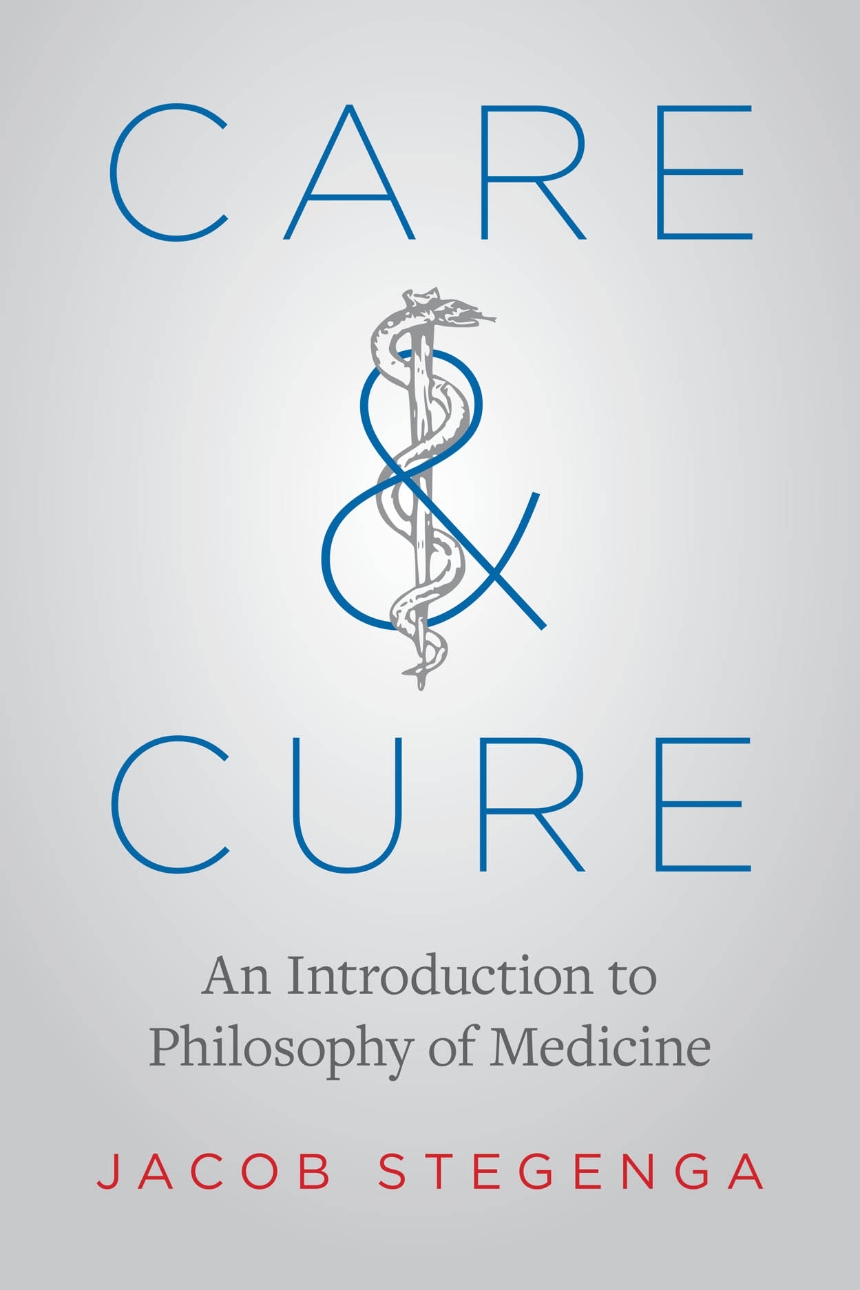Care and Cure
An Introduction to Philosophy of Medicine
The philosophy of medicine has become a vibrant and complex intellectual landscape, and Care and Cure is the first extended attempt to map it. In pursuing the interdependent aims of caring and curing, medicine relies on concepts, theories, inferences, and policies that are often complicated and controversial. Bringing much-needed clarity to the interplay of these diverse problems, Jacob Stegenga describes the core philosophical controversies underlying medicine in this unrivaled introduction to the field.
The fourteen chapters in Care and Cure present and discuss conceptual, metaphysical, epistemological, and political questions that arise in medicine, buttressed with lively illustrative examples ranging from debates over the true nature of disease to the effectiveness of medical interventions and homeopathy. Poised to be the standard sourcebook for anyone seeking a comprehensive overview of the canonical concepts, current state, and cutting edge of this vital field, this concise introduction will be an indispensable resource for students and scholars of medicine and philosophy.
The fourteen chapters in Care and Cure present and discuss conceptual, metaphysical, epistemological, and political questions that arise in medicine, buttressed with lively illustrative examples ranging from debates over the true nature of disease to the effectiveness of medical interventions and homeopathy. Poised to be the standard sourcebook for anyone seeking a comprehensive overview of the canonical concepts, current state, and cutting edge of this vital field, this concise introduction will be an indispensable resource for students and scholars of medicine and philosophy.
Read the introduction and see sample syllabi for courses in the philosophy of medicine.
288 pages | 2 tables | 6 x 9 | © 2018
Philosophy: General Philosophy
Reviews
Table of Contents
Acknowledgments
Note to Teachers
Introduction
Part I. Concepts
Chapter 1. Health
Chapter 2. Disease
Chapter 3. Death
Part II. Models and Kinds
Chapter 4. Causation and Kinds
Chapter 5. Holism and Reductionism
Chapter 6. Controversial Diseases
Part III. Evidence and Inference
Chapter 7. Evidence in Medicine
Chapter 8. Objectivity and the Social Structure of Science
Chapter 9. Inference
Chapter 10. Effectiveness, Skepticism, and Alternatives
Chapter 11. Diagnosis and Screening
Part IV. Values and Policy
Chapter 12. Psychiatry: Care or Control?
Chapter 13. Policy
Chapter 14. Public Health
References
Index
Note to Teachers
Introduction
Part I. Concepts
Chapter 1. Health
1.1 Summary
1.2 Neutralism and Naturalism
1.3 Well-Being and Normativism
1.4 Objectivism and Subjectivism
1.2 Neutralism and Naturalism
1.3 Well-Being and Normativism
1.4 Objectivism and Subjectivism
Further Reading and Discussion Questions
Chapter 2. Disease
2.1 Summary
2.2 Naturalism
2.3 Normativism
2.4 Hybridism
2.5 Eliminativism
2.6 Phenomenology
2.2 Naturalism
2.3 Normativism
2.4 Hybridism
2.5 Eliminativism
2.6 Phenomenology
Further Reading and Discussion Questions
Chapter 3. Death
3.1 Summary
3.2 Defining Death
3.3 The Badness of Death
3.4 Ethics of Killing
Further Reading and Discussion Questions
3.2 Defining Death
3.3 The Badness of Death
3.4 Ethics of Killing
Further Reading and Discussion Questions
Part II. Models and Kinds
Chapter 4. Causation and Kinds
4.1 Summary
4.2 Three Theories of Causation
4.3 Diseases: Monocausal or Multifactorial?
4.4 Nosology
4.5 Precision Medicine
Further Reading and Discussion Questions
4.2 Three Theories of Causation
4.3 Diseases: Monocausal or Multifactorial?
4.4 Nosology
4.5 Precision Medicine
Further Reading and Discussion Questions
Chapter 5. Holism and Reductionism
5.1 Summary
5.2 Disease
5.3 Medical Interventions
5.4 Patient-Physician Relationship
Further Reading and Discussion Questions
5.2 Disease
5.3 Medical Interventions
5.4 Patient-Physician Relationship
Further Reading and Discussion Questions
Chapter 6. Controversial Diseases
6.1 Summary
6.2 Medicalization
6.3 Psychiatric Diseases
6.4 Culture-Bound Syndromes
6.5 Addiction
Further Reading and Discussion Questions
6.2 Medicalization
6.3 Psychiatric Diseases
6.4 Culture-Bound Syndromes
6.5 Addiction
Further Reading and Discussion Questions
Part III. Evidence and Inference
Chapter 7. Evidence in Medicine
7.1 Summary
7.2 Phases of Medical Research
7.3 Bias
7.4 Animal Models
7.5 Randomization
7.6 Meta-analysis
7.7 Mechanisms
Further Reading and Discussion Questions
7.2 Phases of Medical Research
7.3 Bias
7.4 Animal Models
7.5 Randomization
7.6 Meta-analysis
7.7 Mechanisms
Further Reading and Discussion Questions
Chapter 8. Objectivity and the Social Structure of Science
8.1 Summary
8.2 Industry Funding and Publication Bias
8.3 Demarcation
8.4 Value-Laden Science
8.5 Social Epistemology
8.2 Industry Funding and Publication Bias
8.3 Demarcation
8.4 Value-Laden Science
8.5 Social Epistemology
Chapter 9. Inference
9.1 Summary
9.2 Causal Inference
9.3 Extrapolation
9.4 Measuring Effectiveness
9.5 Theories of Statistical Inference
9.6 Testing Precision Medicine
Further Reading and Discussion Questions
9.2 Causal Inference
9.3 Extrapolation
9.4 Measuring Effectiveness
9.5 Theories of Statistical Inference
9.6 Testing Precision Medicine
Further Reading and Discussion Questions
Chapter 10. Effectiveness, Skepticism, and Alternatives
10.1 Summary
10.2 Defining Effectiveness
10.3 Medical Nihilism
10.4 Alternative Medicine
10.5 Placebo
Further Reading and Discussion Questions
10.2 Defining Effectiveness
10.3 Medical Nihilism
10.4 Alternative Medicine
10.5 Placebo
Further Reading and Discussion Questions
Chapter 11. Diagnosis and Screening
11.1 Summary
11.2 Diagnosis
11.3 Logic of Diagnostic Tests
11.4 Screening
Further Reading and Discussion Questions
11.2 Diagnosis
11.3 Logic of Diagnostic Tests
11.4 Screening
Further Reading and Discussion Questions
Part IV. Values and Policy
Chapter 12. Psychiatry: Care or Control?
12.1 Summary
12.2 Psychiatric Nosology
12.3 Anti-psychiatry
12.4 Delusions and Exclusions
Further Reading and Discussion Questions
12.2 Psychiatric Nosology
12.3 Anti-psychiatry
12.4 Delusions and Exclusions
Further Reading and Discussion Questions
Chapter 13. Policy
13.1 Summary
13.2 Research Priorities
13.3 Intellectual Property
13.4 Standards for Regulation
Further Reading and Discussion Questions
13.2 Research Priorities
13.3 Intellectual Property
13.4 Standards for Regulation
Further Reading and Discussion Questions
Chapter 14. Public Health
14.1 Summary
14.2 Social Epidemiology
14.3 Preventive Medicine
14.4 Health Inequalities
Further Reading and Discussion Question
14.2 Social Epidemiology
14.3 Preventive Medicine
14.4 Health Inequalities
Further Reading and Discussion Question
References
Index
